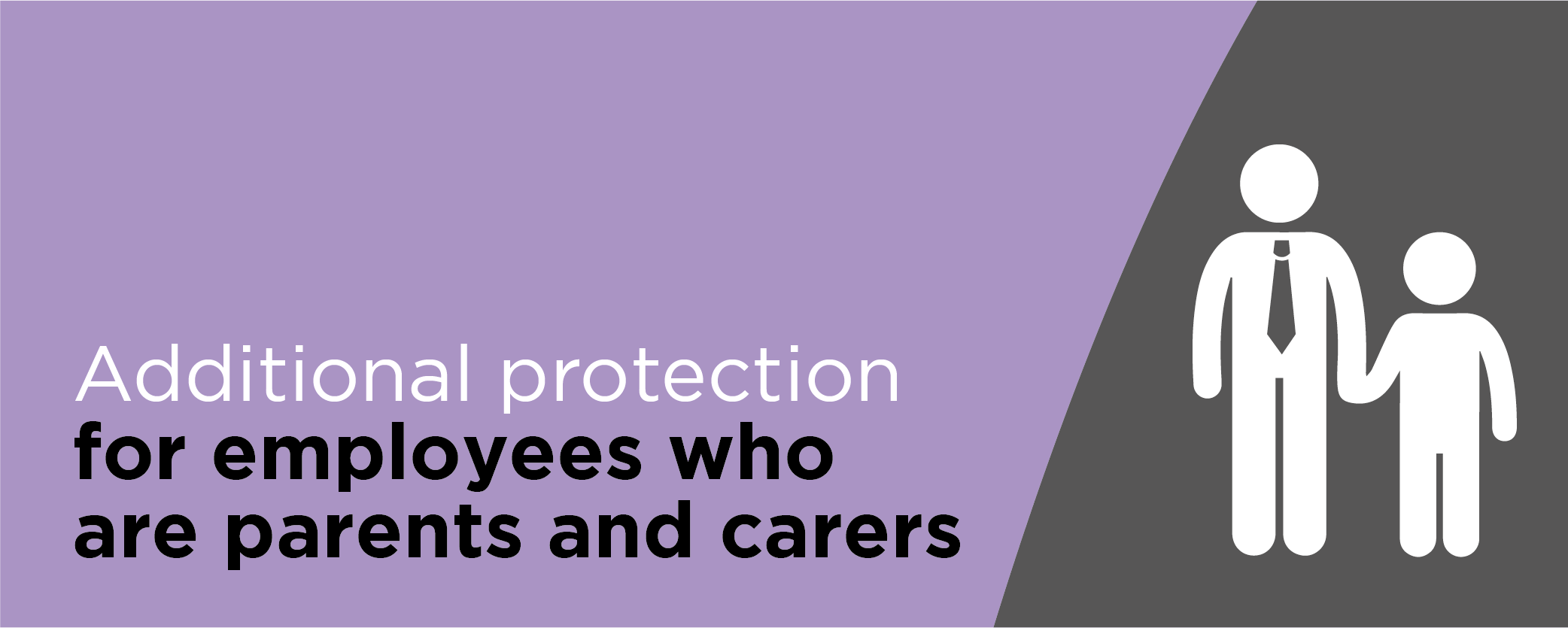- Basildon 01268244144
- Chelmsford 01245453800
- Colchester 01206217300
- London 020 4586 1280
New employment laws to provide more protection for employees who are parents and carers

- Posted
- AuthorKaren Morovic

On 24 May 2023, three Acts of Parliament received Royal Assent representing an important step forward in the provision of additional employment law protection for parents and carers.
The details of the new laws will be set out in secondary legislation, which has still to be finalised. Below is what we know so far:
1. Protection from Redundancy (Pregnancy and Family Leave) Act 2023
What are the new rights?
At present, in a redundancy situation, employees on maternity, adoption or shared parental leave have an automatic right to be offered any suitable vacancies (where available) as priority over others.
This right is being extended and it is expected it will be applicable during pregnancy, maternity, adoption and parental leave, and for six months after a return to work. We await the full regulations in order to uncover the detail.
When will the new rights take effect?
Although the Redundancy (Pregnancy and Family Leave) Act 2023 is now in force, the government needs to make regulations to extend the redundancy protection for those on maternity and other family-related leave. The government has said it will do so “in due course” (press release dated 25 May 2023). In reality, we expect this to be some time during 2024.
2. Carer’s Leave Act 2023
What are the new rights?
Employees who are caring for a dependant with a long-term need will be entitled to a week of flexible unpaid leave in any 12 months.
We expect, under regulations yet to be passed, that:
- The employee will be entitled to take the leave in individual days or half days unlike parental leave, which can only be used in blocks of a week or whole numbers of weeks.
- The employee will be entitled to claim leave from the first day of their employment and will be protected from dismissal or any detriment as a result of having exercised their right to take leave.
- The employee will be required to give notice of carer’s leave and the notice period must be twice the length of the leave being requested, plus one day.
- The employer may postpone, but cannot deny, the request for the carer’s leave. However, this will only be possible where the employer can show that the operation of their business will be unduly disrupted.
- Employees will be entitled to self-certify their entitlement to claim the leave without having to produce evidence.
When will the new rights apply?
It is expected that the implementation of the rights will be introduced no later than April 2024
3. Neonatal Care (Leave and Pay) Act 2023
What are the new rights?
Employees who have parental responsibility of a baby (up to the age of 28 days), and the baby receives neonatal care for a period of at least seven days, will be entitled to at least one week’s paid leave, which must be taken before at least 68 weeks from the date of the child’s birth.
We expect regulations to provide for leave of up to 12 weeks with the right to take neonatal care leave applying from the first day of employment.
When will the right to neonatal care pay apply?
The right to neonatal care pay will apply to all employees with at least 26 weeks’ continuous service and whose weekly earnings are at or above the lower earnings limit (currently £123 per week for 2023-24).
When do the new rights commence?
It is expected that the new rights will take effect by April 2025.
4. Employment Relations (Flexible Working) Act 2023
The government will bring in Regulations to implement the Employment Relations (Flexible Working ) Act 2023 – expected to be by July/August 2024.
The proposed changes would mean that employees can make a flexible working request on day one of employment. In addition, employees would be able to make two requests in any 12-month period. Employers will also have a timeframe of two months in which to decide whether to grant the requests (currently, they have three months to decide).
As soon as we know more and the regulations are passed we will provide further updates. We will be working with our commercial clients to ensure they have appropriate policies and staff are aware of the changes. If you have any questions or would like support in ensuring you are fully aware of these changes and have appropriate, fit-for-your-business policies, please get in touch with the BLHR & Employment Team. We will be happy to discuss how we can help. We offer a fixed fee BLHR service which you can access here.


Comments